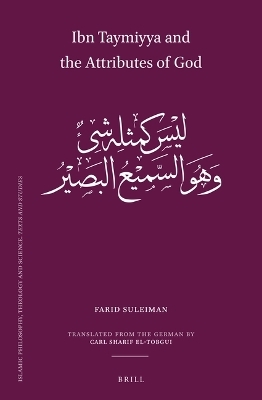
Ibn Taymiyya and the Attributes of God
Brill (Verlag)
978-90-04-49989-8 (ISBN)
In Ibn Taymiyya and the Attributes of God (orig. published in German, 2019), Farid Suleiman pieces together, on the basis of statements scattered unsystematically over numerous individual treatises, an overall picture of the methodological foundations of Ibn Taymiyya’s doctrine of the divine attributes. He then examines how Ibn Taymiyya applies these foundational principles as exemplified in his treatment of selected divine attributes. Throughout the book, Suleiman relates Ibn Taymiyya’s positions to the larger context of Islamic intellectual history.
The book was awarded the Dissertation Prize 2019 by the Academy for Islam in Research and Society (AIWG) and the Classical Islamic Book Prize by Gorgias Press (2020).
Farid Suleiman, PhD (2018), is Lecturer in Islamic Theology at Greifswald University. His current research takes the insights on language gained from Ludwig Wittgenstein as a departure point for shedding new lights on the character and development of Islamic intellectual history.
Acknowledgements (to the English translation)
Acknowledgements (of the original German version)
List of Figures and Tables
1 Introduction
1 State of the Field
2 Objectives and Approach
3 Overview of the Works of Ibn Taymiyya Most Frequently Used in This Study
Part 1 Ibn Taymiyya’s Biography and the History of the Divine Attributes in Islamic Thought before His Time
2 Ibn Taymiyya’s Biography
3 The Divine Attributes in Islamic Intellectual History up to the Time of Ibn Taymiyya
1 The Emergence of the Debate over the Divine Attributes in Early Islam
2 The Muʿtazila
3 The Falāsifa
4 Ahl al-Ḥadīth
5 The Ashʿarīs
Part 2 The Methodological Foundations of Ibn Taymiyya’s Doctrine of the Divine Attributes
4 Ontological Foundations
1 The Term wujūd: Meaning and Gradations
2 Likeness (mithl, tamāthul) and Similarity (shibh, tashābuh, ishtibāh) among Existent Things
3 Ibn Taymiyya’s Ontological Conceptualism
4 Ibn Taymiyya’s Critique of the Doctrine of the Unity of Being (waḥdat al-wujūd) in Speculative Sufism
5 Linguistic Foundations
1 The ḥaqīqa–majāz Dichotomy
2 On the Semantic Relationship of Homonymous Expressions: Ibn Taymiyya’s Linguistic Counterproposal to the ḥaqīqa–majāz Dichotomy
3 What Are the Theological Consequences of Ibn Taymiyya’s Alternative to the ḥaqīqa–majāz Dichotomy?
6 Hermeneutical Foundations
1 Verse Q. 3:7—Ibn Taymiyya’s Understanding of the Terms muḥkam, mutashābih, and taʾwīl
2 Ibn Taymiyya’s Challenge to the Validity of Taʾwīl Majāzī: Attempting to Limit the Scope of Application of the Universal Rule (al-qānūn al-kullī)
3 The Two Principles and the Seven Basic Rules for Interpreting the Divine Attributes
7 Epistemological Foundations
1 On the Applicability of Qiyās in Theology
2 The Epistemic Value of Textual Indicants: Ibn Taymiyya in Debate with al-Rāzī
8 Summary
Part 3 The Divine Essence and Attributes in Focus
9 Temporally Originating States and Acts (ḥawādith) in the Divine Essence
10 Case Studies of Selected Divine Attributes
1 al-ʿAdl: God’s Justice
2 al-Kalām: God’s Speech
3 al-Istiwāʾ: God’s Rising over His Throne
4 al-Maʿiyya: God’s “Withness”
11 Summary
12 Evaluation and Conclusion
Bibliography
Index of People and Subjects
Index of Quranic Verses
| Erscheinungsdatum | 12.12.2023 |
|---|---|
| Reihe/Serie | Islamic Philosophy, Theology and Science. Texts and Studies ; 125 |
| Übersetzer | Carl Sharif El-Tobgui |
| Verlagsort | Leiden |
| Sprache | englisch |
| Maße | 155 x 235 mm |
| Gewicht | 795 g |
| Themenwelt | Geisteswissenschaften ► Geschichte ► Regional- / Ländergeschichte |
| Geisteswissenschaften ► Philosophie ► Östliche Philosophie | |
| Geisteswissenschaften ► Religion / Theologie ► Islam | |
| ISBN-10 | 90-04-49989-X / 900449989X |
| ISBN-13 | 978-90-04-49989-8 / 9789004499898 |
| Zustand | Neuware |
| Haben Sie eine Frage zum Produkt? |
aus dem Bereich


